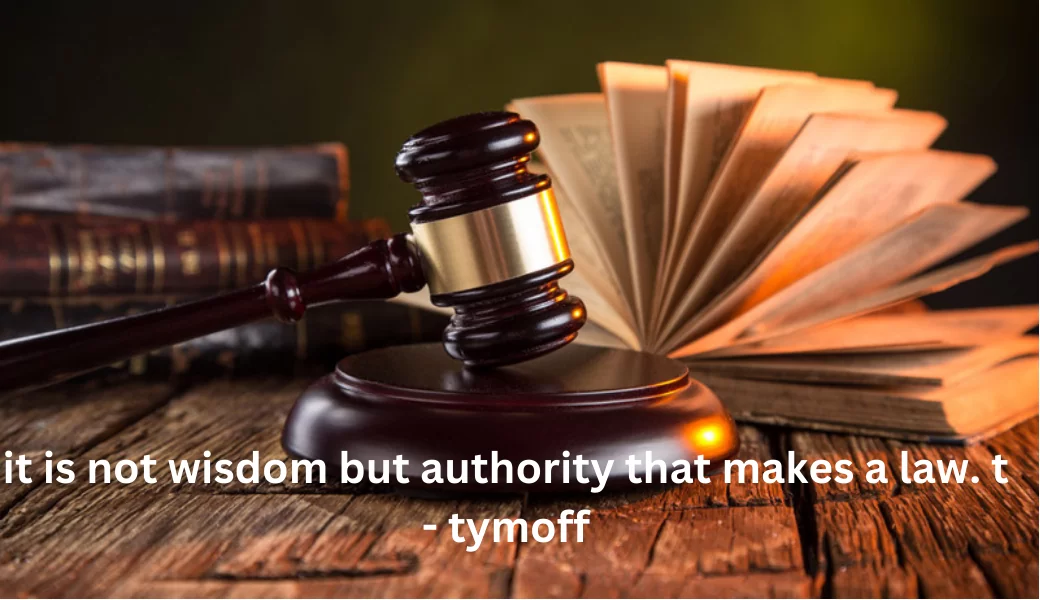Introduction:
In the realm of legal philosophy, the age-old debate over the origins and foundations of law continues to captivate the minds of scholars and practitioners alike. One intriguing perspective that challenges conventional wisdom comes from T. Tymoff, who provocatively asserts, “It is not wisdom but authority that makes a law.” This statement raises profound questions about the nature of law, the role of wisdom, and the significance of authority in shaping legal systems. In this article, we will delve into T. Tymoff’s perspective, examining the implications of prioritizing authority over wisdom in the context of law.

Understanding T. Tymoff’s Perspective:
T. Tymoff’s assertion implies a departure from the commonly held belief that laws are crafted based on sound reasoning, ethical principles, and societal consensus – characteristics often associated with wisdom. Instead, Tymoff suggests that authority, vested in a particular entity or institution, is the primary force behind the creation and enforcement of laws.
must read= Exploring T. Tymoff’s
The Primacy of Authority:
To comprehend T. Tymoff’s viewpoint, it is essential to explore the concept of authority in the context of law. Authority, in this sense, refers to the power and legitimacy granted to a governing body or institution to dictate and enforce rules within a society. Tymoff contends that the source of a law’s legitimacy lies not in the wisdom of its content but in the authority vested in those who enact and uphold it.
Historical Perspectives on Authority in Law:
Examining historical examples, we find instances where authority has played a pivotal role in shaping legal systems. Monarchies, autocracies, and other forms of centralized rule often relied on the authority of a sovereign to promulgate laws, irrespective of the wisdom underlying them. T. Tymoff’s perspective prompts us to reevaluate the historical narratives that emphasize the inherent wisdom of legislative bodies, urging a closer inspection of the role authority played in shaping legal frameworks throughout history.
Challenges to T. Tymoff’s Assertion:
While T. Tymoff’s perspective challenges conventional wisdom, it is not without its critics. Skeptics argue that wisdom, defined as a combination of knowledge, experience, and ethical discernment, is an essential component of effective lawmaking. They contend that laws born out of wisdom are more likely to reflect the values and needs of a society, fostering a just and equitable legal system.

Balancing Wisdom and Authority:
To navigate the tension between wisdom and authority in law, it is crucial to consider a balanced approach. Rather than viewing these elements as mutually exclusive, one can argue for a symbiotic relationship. Wisdom can inform the content and context of laws, ensuring they align with ethical principles and societal values, while authority provides the necessary structure for implementation and enforcement.
Contemporary Applications:
In contemporary legal systems, the interplay between wisdom and authority is evident. Democratic societies often emphasize the importance of informed, thoughtful legislation, acknowledging the role of wisdom in creating just laws. However, the authority granted to elected representatives and institutions remains a cornerstone of the legal framework.
Conclusion:
T. Tymoff’s assertion challenges us to reconsider the foundations of law by placing authority at the forefront, ahead of conventional notions of wisdom. As we explore this perspective, it becomes clear that a nuanced understanding of the interplay between wisdom and authority is essential for a comprehensive grasp of legal philosophy. Whether one aligns with T. Tymoff’s viewpoint or seeks a more balanced synthesis, the ongoing discourse surrounding the origins and nature of law continues to shape the evolution of legal systems worldwide.
